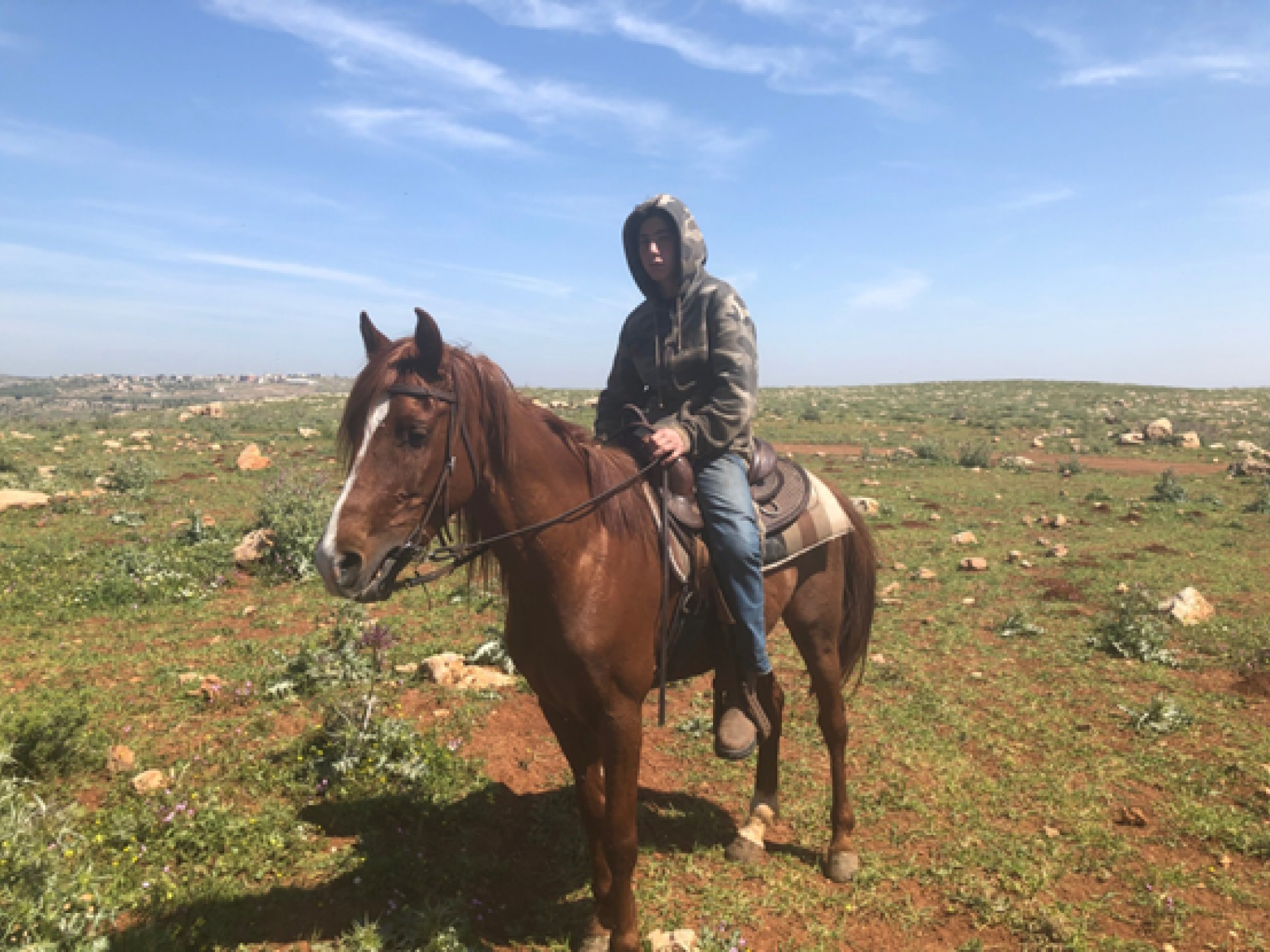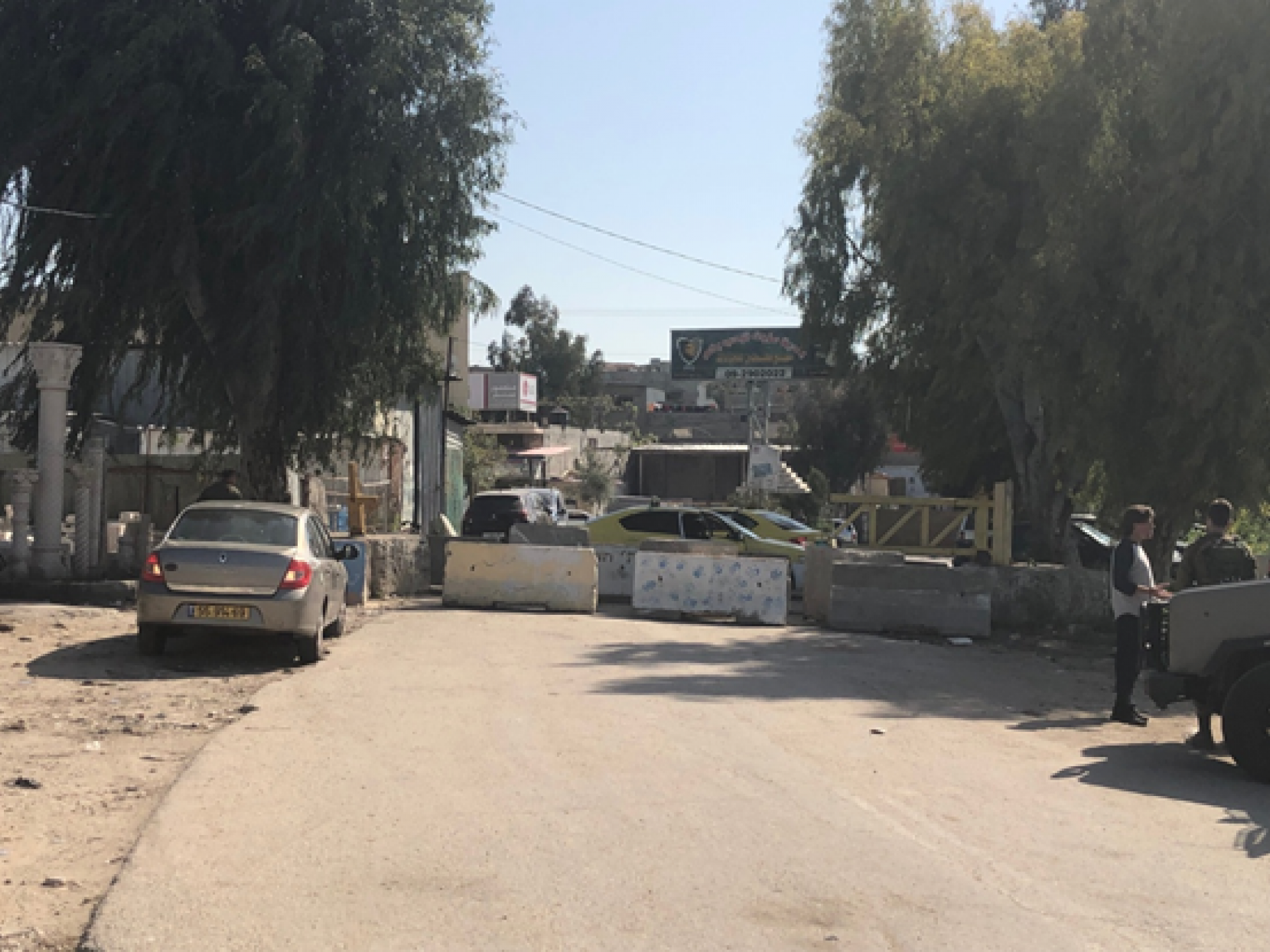Jordan Valley: Two hold on – one says it’s mine, the other – it’s all ours
Accompanying Palestinian shepherds around Rashash:
We left quite late to the relatively unknown. The shepherds whom we were supposed to accompany were not answering the phone. By the time we got to the junction we were still told to go to them. We turned right at the end of road 505 and reached the Mughayer area, Rashash. One flock of sheep passed us. The Rashash community, as I learned that day, consists of Jahalin Bedouins who branched off the rest of the tribe following a dispute about 30 years ago. It came to this area and settled down here, on the slopes before coming down the hill eastward to the valley.
Most of the livestock was already grazing. We joined H. and his flock in an area situated a few hundred meters from Rashash. To the south we saw the fence of the nearby military base. Our friend the shepherd told us that settler-colonist Elhanan who lives close by would appear shortly as he does daily.
And indeed after a short while a horse and its young rider appeared from the south and rode around us at a safe distance. Later a mini-tractor driven by Elhanan (accompanied by two small children) would arrive and drive along the dirt track to and fro. We understood from Guy as well as from Elhanan himself that the two parties have reached an agreement at the behest of the army because this dirt track and its continuation downhill towards the Valley divides the area, so that the larger northern part is at the disposal of the Palestinian shepherds, while the southern part is the settler-colonist’s.
Later the settler-colonist’s herd would arrive and graze in the southern part. A Palestinian flock arrived from Ujja in the direction of the village.
The organized show that took place there included the boy who continued riding his horse around us, with the same set expression on his face, and not answering our questions. Our flock remained in place and ate constantly. Amnon walks towards the new flock that arrives and later I proceed towards the flock that continued westwards.
Then… at some point we both went towards Elhanan and several others who joined him, looking from afar like a group of 5-6 youngsters. We held a conversation with Elhanan (while the youngsters around him all took pictures of us, as we did of them), trying to achieve something, each of us “sticking to our guns”. Elhanan claimed that we are the ones disrupting here, coming to sow dispute more or less. On other days, when we’re not there, they communicate with the Palestinian shepherds. They know each other. Not to the extent of sharing coffee, but understanding the limits placed on each. He has no violent intentions, has never exerted any violence. Prove it. Pictures…
We returned to 1948 (founding of the Israeli state) in our argument. We proceeded to 1967 (occupation), who was born when and who feels guilty and who is certain it’s all his, and took this path about 4-5 times over in vain. But at least we talked. According to him we feel guilty for having done what we did to the Arabs in 1948 and project this onto the settler-colonists who aren’t really doing anything wrong. In fact, according to him, everything is ours, state lands. H. (who looked on and later showed interest in knowing what it was all about) sees it all as his. He is not willing to accept the army-imposed borders. He does not accept the existing agreement. Still, he seems to prefer grazing in the northern part, assigned to him by the “agreement”, rather than pursue confrontation.
Photo:
The main entrance to Azoun village: blocked now for several weeks
Demonstration at Qaddoum: nothing new
We arrived late, from afar we saw the plumes of smoke rising in the air. The protest demonstrations proceed as usual, after the failure of the “attempt at agreements and the opening of the road”. Nothing really happened, said S. They (the Israelis) pretended and then took up their harassments as usual. We left when the demo was over, around 3 p.m. A last volley and the villagers’ yells at the soldiers closed the demo. Teargas fumes invade our eyes and noses as if they’re a part of local nature. Like everything else that is so unbearable for such a long time.
Azoun is still under siege
A military vehicle stands at the entrance to Azoun, a Palestinian town on the main road between Nablus and Qalqiliya. Square concrete slabs seal the entrance. The yellow metal arm (put up by the army) is cut in the middle. We were told that this was the pretext for the present crisis. The DCO claims that the Palestinians cut the gate in order to sell the metal. Something of that nature. Under closure , the army continues its nightly incursions in the village, invade houses, that whole mess.
, the army continues its nightly incursions in the village, invade houses, that whole mess.
On the spot are soldiers headed by a very nervous major who – with his looks and voice – made it very clear how much he detests us. Amnon (our guest) asked him innocent questions, and the major ordered his soldiers not to answer.
We continued to Izbat Tabeeb, a Palestinian village about 6 km east of Qalqiliya. A long line of cars stretched on both sides of the temporary army checkpoint. Military vehicles blocked the road leading to the whole area: Izbat Tabee, ‘Asala, Azoun, Thult, as well as the northern side of the road to Jayous etc. Drivers seated in their cars were at the end of their nerves, having to wait for such a while. Someone said to me (about the soldiers): “How can you give birth to such children!? They come out of your ass!”
The same soldiers who “welcomed” us at Azoun came here before us. I shall skip describing their vulgar conduct and abusive language. What most amazed me was that they don’t enable people to come out of the village or go back home. They don’t conduct searches or inspections but just plainly close the gate for such and such a time, then open it, then close it. Because they can.
Another amazing sight: two women-soldiers standing on the hood of the military vehicle, holding their weapons demonstratively, ridiculously, disgustingly.
Demonstration at Qaddoum: nothing new
We arrived late, from afar we saw the plumes of smoke rising in the air. The protest demonstrations proceed as usual, after the failure of the “attempt at agreements and the opening of the road”. Nothing really happened, said S. They (the Israelis) pretended and then took up their harassments as usual. We left when the demo was over, around 3 p.m. A last volley and the villagers’ yells at the soldiers closed the demo. Teargas fumes invade our eyes and noses as if they’re a part of local nature. Like everything else that is so unbearable for such a long time.
Azoun is still under siege
A military vehicle stands at the entrance to Azoun, a Palestinian town on the main road between Nablus and Qalqiliya. Square concrete slabs seal the entrance. The yellow metal arm (put up by the army) is cut in the middle. We were told that this was the pretext for the present crisis. The DCO claims that the Palestinians cut the gate in order to sell the metal. Something of that nature. Under closure , the army continues its nightly incursions in the village, invade houses, that whole mess.
, the army continues its nightly incursions in the village, invade houses, that whole mess.
On the spot are soldiers headed by a very nervous major who – with his looks and voice – made it very clear how much he detests us. Amnon (our guest) asked him innocent questions, and the major ordered his soldiers not to answer.
We continued to Izbat Tabeeb, a Palestinian village about 6 km east of Qalqiliya. A long line of cars stretched on both sides of the temporary army checkpoint. Military vehicles blocked the road leading to the whole area: Izbat Tabee, ‘Asala, Azoun, Thult, as well as the northern side of the road to Jayous etc. Drivers seated in their cars were at the end of their nerves, having to wait for such a while. Someone said to me (about the soldiers): “How can you give birth to such children!? They come out of your ass!”
The same soldiers who “welcomed” us at Azoun came here before us. I shall skip describing their vulgar conduct and abusive language. What most amazed me was that they don’t enable people to come out of the village or go back home. They don’t conduct searches or inspections but just plainly close the gate for such and such a time, then open it, then close it. Because they can.
Another amazing sight: two women-soldiers standing on the hood of the military vehicle, holding their weapons demonstratively, ridiculously, disgustingly.



